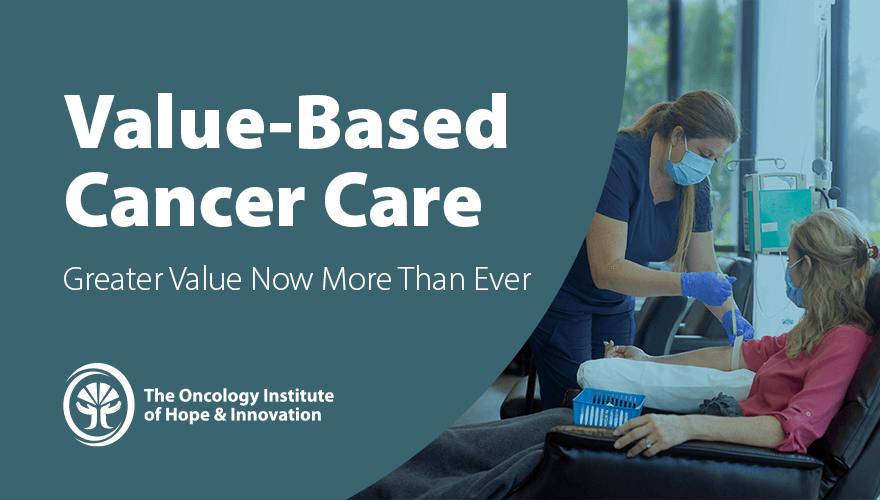By: Yale D. Podnos, MD, MPH, FACS
Chief Medical Officer
Three key advantages of value-based cancer care during the COVID-19 pandemic
The coronavirus crisis has highlighted the unique advantages of the value-based model of cancer care. Three of these advantages are especially important during this critical time in history:
1. Value-based cancer care limits unnecessary exposure to Covid-19 by keeping vulnerable patients out of the hospital.
Better outpatient symptom management, a key component of successful value-based care, helps reduce hospital admissions and readmissions by addressing treatment earlier in the outpatient setting before severity necessitates ED and lab visits and, subsequently, hospitalization. By doing that, hospital admissions and readmissions in that tremendously vulnerable population are reduced leading to a reduction in their risk of coronavirus exposure (in addition to other hospital-acquired illnesses).
Another key component of any value-based cancer care model is appropriate and early use of palliative care and hospice. By focusing on symptom management in this population, hospital admissions decrease, keeping critically ill, advanced cancer patients away from the potential infections seen in hospitals.
Stanford study shows both higher quality and lower costs with value-based cancer care
Stanford University School of Medicine, the health plan CareMore Health, and the value-based cancer care organization The Oncology Institute of Hope and Innovation recently conducted a study showing 40% fewer inpatient admissions and 75% fewer ER admissions (with no difference in survival rates) among patients in the value-based care model.
Titled “Enhancing community capacity to deliver value-based cancer care at the end-of-life,” the study evaluated the effect of intervention using lay health workers (LHWs) for end-of-life cancer care. Specifically, the study evaluated healthcare use in the last month of life and its impact on quality of care and financial burden on patients.
The study enrolled patients newly diagnosed with malignant cancers and compared outcomes in a control group of all patients diagnosed with cancer in the year prior to intervention.
The value-based cancer care model used LHWs, which are non-physician members of the community who have received specialized training, to support patient care and navigation.
Study results, presented at the 2019 ASCO Quality Care Symposium, demonstrated:
- Better end-of-life care with the value-based model
- No difference in survival between the groups
- Among patients receiving value-based care:
- 25% lower median total healthcare costs from diagnosis until death
- 45% increase in hospice use
- 40% fewer acute care facility deaths
2. Value-based care makes good use of limited resources by keeping cancer patients out of the hospital and reserving ICU and ER space for acutely ill patients.
Hospital resources are extremely strained by the COVID-19 pandemic. ERs are packed and even patients with severe conditions are left waiting many hours for a bed. Value-based oncology providers like The Oncology Institute are uniquely positioned to help reduce the strain on local hospitals by managing symptoms in the outpatient setting. This value-based care model reduces inpatient admissions by 40% and ER admissions by 75% while still maintaining the same quality outcomes for patients. While this is hugely valuable for patients and the healthcare system at large at any time, it is especially critical now.
3. In addition to limiting unnecessary treatment, value-based cancer care improves quality of life for patients and their caregivers.
Cancer care near the end of life too often involves excessive, ineffective chemotherapy, drugs, and invasive procedures. These treatment approaches, though well-intended, are often futile and subject the patient to possible complications and side effects that require hospitalization In addition to the safety aspects previously discussed, being hospitalized, especially now during the COVID-19 pandemic, severely diminishes quality of life as patients are separated from family and friends, leading to feelings of isolation and mental health challenges. With this also comes the potential for huge medical bills with little or nothing to show for it.
Bottom line:
Value-based care plays a critical role in our healthcare delivery system at all times, but is especially important during times of crisis like the global Covid-19 pandemic.

About Yale Podnos, MD, MPH, FACS
A native of Southern California, Yale D. Podnos, MD, MPH, FACS, attended New York University, graduating with a degree in biology. He attended graduate school at the Harvard School of Public Health and medical school at the University of California, Irvine School of Medicine, where he also completed his residency in general surgery.
After his residency, he completed a fellowship in surgical oncology at the City of Hope. After training, Dr. Podnos joined the faculty at Duke University and later became the Chairman of the Department of Surgery and Director of Surgical Oncology at UNC Rex Healthcare in Raleigh, NC.
In practice, his specialties are surgical care of patients with pancreatic, hepatobiliary, melanoma, and esophagus cancers. He has authored over 60 scientific publications.


